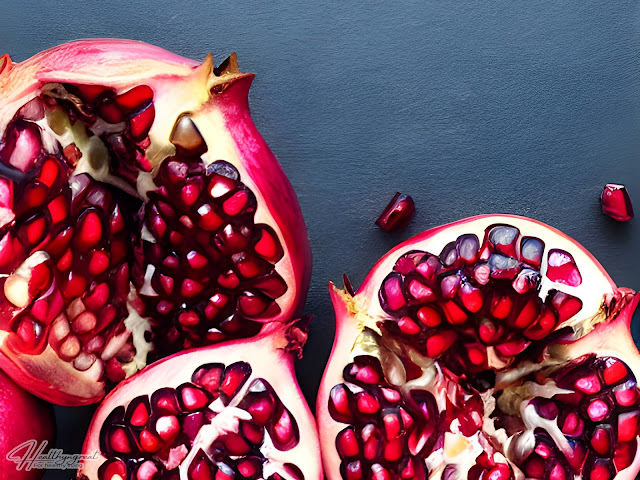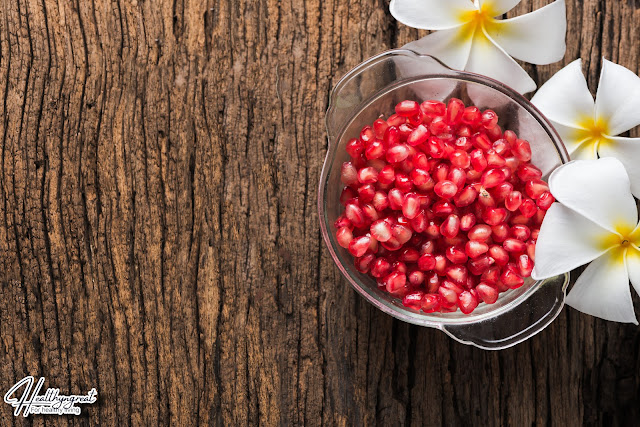The Health Benefits of Pomegranate: Science-Backed Facts
Introduction:
Pomegranate is a fruit that has been prized for its health benefits for centuries. Its vibrant red color and sweet-tart taste make it a favorite ingredient in many recipes, from salads to smoothies. But did you know that pomegranate is also packed with nutrients and antioxidants that can boost your health in many ways? In this article, we'll take a closer look at the science behind the health benefits of pomegranate.
Keywords:
pomegranate, health benefits, antioxidants, nutrients, science, research
Section 1: Nutritional Profile of Pomegranate
Pomegranate is a rich source of vitamins, minerals, and fiber. One medium-sized pomegranate contains:
Vitamin C: 28% of the Daily Value (DV)
Vitamin K: 36% of the DV
Folate: 16% of the DV
Potassium: 12% of the DV
Fiber: 7 grams
Pomegranate also contains unique antioxidants called punicalagins, which are found in the juice and peel of the fruit.
Keywords:
nutrients, vitamins, minerals, fiber, punicalagins, antioxidants.
Section 2: Health Benefits of Pomegranate
Numerous studies have shown that pomegranate can offer a range of health benefits, including:
Pomegranate is a great source of antioxidants
Pomegranate is loaded with antioxidants, which are compounds that protect your cells from damage caused by free radicals. Free radicals are unstable molecules that can damage cells, cause inflammation, and increase the risk of chronic diseases like cancer and heart disease. Studies have shown that pomegranate has higher levels of antioxidants than many other fruits and vegetables.
Pomegranate can reduce inflammation
Chronic inflammation is linked to many health problems, including heart disease, cancer, and Alzheimer's disease. Pomegranate contains compounds that have anti-inflammatory effects, which may help reduce the risk of these diseases. In one study, people with type 2 diabetes who drank pomegranate juice for 12 weeks had lower levels of inflammatory markers in their blood.
Pomegranate may improve heart health
Heart disease is the leading cause of death worldwide, but certain lifestyle choices, such as a healthy diet, can help reduce the risk. Pomegranate has been shown to improve several risk factors for heart disease, including high blood pressure, high cholesterol, and oxidative stress. In one study, people who drank pomegranate juice for two weeks had lower blood pressure and better blood flow to the heart.
Pomegranate may have anticancer properties
Cancer is a complex disease, but some studies suggest that pomegranate may have anticancer properties. For example, test-tube studies have found that pomegranate extract can inhibit the growth of cancer cells in the breast, prostate, and colon. However, more research is needed to determine whether these findings translate to humans.
Pomegranate can improve memory and cognitive function
As we age, our cognitive function naturally declines, but certain nutrients and lifestyle choices can help preserve brain function. Pomegranate contains compounds that may help protect the brain and improve cognitive function. In one study, people who drank pomegranate juice for four weeks had improved memory and attention compared to those who drank a placebo.
Section 3: How to Incorporate Pomegranate into Your Diet
If you're interested in reaping the health benefits of pomegranate, there are many ways to incorporate it into your diet. Here are some ideas:
Add pomegranate seeds to salads, oatmeal, or yogurt
Use pomegranate juice as a marinade or salad dressing
Make a pomegranate smoothie with Greek yogurt and frozen berries
Sprinkle pomegranate powder on roasted vegetables or popcorn
Keywords:
diet, recipes, pomegranate seeds, pomegranate juice, pomegranate smoothie, pomegranate powder.
The Bottom Line
Pomegranate is a delicious and nutritious fruit that has been valued for its medicinal properties for centuries. The scientific evidence suggests that pomegranate has many health benefits, including reducing inflammation, improving heart health, and potentially reducing the risk of cancer. If you're looking to add more antioxidants and nutrients to your diet, consider incorporating pomegranate into your meals or drinking pomegranate juice. However, it's important to note that pomegranate can interact with certain medications, so be sure to talk to your doctor before adding it to your diet.











Post a Comment
0 Comments
If you have any doubt please let me know.